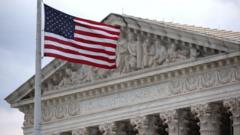This ruling doesn't serve as a nationwide precedent, leaving the possibility for the court to address similar cases in the future. Justice Amy Coney Barrett recused herself, and the court issued a brief announcement affirming the lower court's judgment. The case sparked discussions on the First Amendment's implications concerning religious freedom and government funding.
Oklahoma Attorney General Gentner Drummond welcomed the court's ruling, expressing that it protected taxpayers and maintained the separation of church and state. He stated, "This ruling ensures that Oklahoma taxpayers will not be forced to fund radical Islamic schools." Conversely, the Catholic school's representatives expressed disappointment, arguing that denying funding due to their religious affiliation was discriminatory.
Despite the ruling, the school officials remain committed to providing educational options, indicating a possible shift towards virtual Catholic education. Their proposal intended to serve approximately 500 students, blending religious teachings with standard academic instructions. This charter school initiative faced debates within the state, as Governor Kevin Stitt supported its approval while Drummond opposed it, culminating in legal action.
The tensions surrounding charter schools have intensified, particularly among conservative advocates, who view them as a means to enhance parental control over education. The approval and subsequent legal challenges concerning this religious charter school have further fueled discussions on educational freedoms and taxpayer funding.
In conclusion, the Supreme Court's recent decision reflects ongoing disputes regarding the intersection of religion and education, underscoring how contentious the public funding of religiously affiliated institutions remains in the United States.
Oklahoma Attorney General Gentner Drummond welcomed the court's ruling, expressing that it protected taxpayers and maintained the separation of church and state. He stated, "This ruling ensures that Oklahoma taxpayers will not be forced to fund radical Islamic schools." Conversely, the Catholic school's representatives expressed disappointment, arguing that denying funding due to their religious affiliation was discriminatory.
Despite the ruling, the school officials remain committed to providing educational options, indicating a possible shift towards virtual Catholic education. Their proposal intended to serve approximately 500 students, blending religious teachings with standard academic instructions. This charter school initiative faced debates within the state, as Governor Kevin Stitt supported its approval while Drummond opposed it, culminating in legal action.
The tensions surrounding charter schools have intensified, particularly among conservative advocates, who view them as a means to enhance parental control over education. The approval and subsequent legal challenges concerning this religious charter school have further fueled discussions on educational freedoms and taxpayer funding.
In conclusion, the Supreme Court's recent decision reflects ongoing disputes regarding the intersection of religion and education, underscoring how contentious the public funding of religiously affiliated institutions remains in the United States.



















